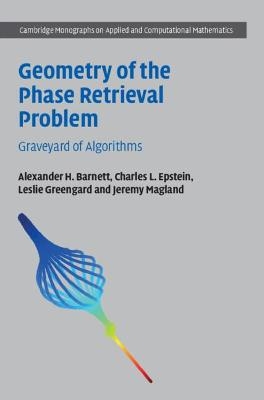
Geometry of the Phase Retrieval Problem
Cambridge University Press (Verlag)
978-1-316-51887-8 (ISBN)
Recovering the phase of the Fourier transform is a ubiquitous problem in imaging applications from astronomy to nanoscale X-ray diffraction imaging. Despite the efforts of a multitude of scientists, from astronomers to mathematicians, there is, as yet, no satisfactory theoretical or algorithmic solution to this class of problems. Written for mathematicians, physicists and engineers working in image analysis and reconstruction, this book introduces a conceptual, geometric framework for the analysis of these problems, leading to a deeper understanding of the essential, algorithmically independent, difficulty of their solutions. Using this framework, the book studies standard algorithms and a range of theoretical issues in phase retrieval and provides several new algorithms and approaches to this problem with the potential to improve the reconstructed images. The book is lavishly illustrated with the results of numerous numerical experiments that motivate the theoretical development and place it in the context of practical applications.
Alexander H. Barnett is Group Leader for Numerical Analysis at the Center for Computational Mathematics in the Flatiron Institute. He has published around 60 papers on partial differential equations, waves, fast algorithms, integral equations, neuroscience, imaging, signal processing, inverse problems, and physics, and received several research grants from the National Science Foundation. Charles L. Epstein is the Thomas A. Scott Professor of Mathematics at the University of Pennsylvania, where he founded the graduate group in Applied Mathematics and Computational Science. He has worked on a wide range of problems in pure and applied analysis and is the author of a widely used textbook An Introduction to the Mathematics of Medical Imaging (SIAM 2008). He shared the Bergman Prize in 2016 with Francois Treves and is a fellow of the AAAS and the AMS. Leslie Greengard is Silver Professor of Mathematics and Computer Science at the Courant Institute, New York University and Director of the Center for Computational Mathematics at the Flatiron Institute. His is co-inventor of several widely used fast algorithms and a member of the American Academy of Arts and Sciences, the National Academy of Sciences, and the National Academy of Engineering. Jeremy Magland is a Senior Data Scientist at the Flatiron Institute. He received his PhD in Mathematics from the University of Pennsylvania. Prior to joining the Flatiron Institute in 2015, he worked for about a decade as a research scientist in the Radiology Department of the Hospital of the University of Pennsylvania, where he developed software systems that dramatically streamlined experimental work on MR-scanners.
Part I. Theoretical Foundations: 1. The geometry near an intersection; 2. Well posedness; 3. Uniqueness and the non-negativity constraint; 4. Some preliminary conclusions; Part II. Analysis of Algorithms for Phase Retrieval: 6. Introduction to Part II; 7. Algorithms for Phase Retrieval; 8. Discrete classical phase retrieval; 9. The non-negativity constraint; 10. Asymptotics of hybrid iterative maps; Part III. Further Properties of Hybrid Iterative Algorithms and Suggestions for Improvement: 11. Introduction to Part III; 12. Statistics of algorithms; 13. Suggestions for improvements; 14. Concluding Remarks; 15. Notational conventions.
| Erscheinungsdatum | 27.04.2022 |
|---|---|
| Reihe/Serie | Cambridge Monographs on Applied and Computational Mathematics |
| Zusatzinfo | Worked examples or Exercises |
| Verlagsort | Cambridge |
| Sprache | englisch |
| Maße | 156 x 236 mm |
| Gewicht | 607 g |
| Themenwelt | Mathematik / Informatik ► Informatik ► Theorie / Studium |
| Mathematik / Informatik ► Mathematik ► Analysis | |
| ISBN-10 | 1-316-51887-6 / 1316518876 |
| ISBN-13 | 978-1-316-51887-8 / 9781316518878 |
| Zustand | Neuware |
| Haben Sie eine Frage zum Produkt? |
aus dem Bereich


